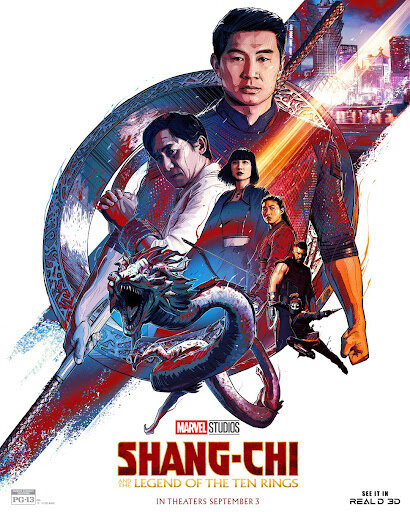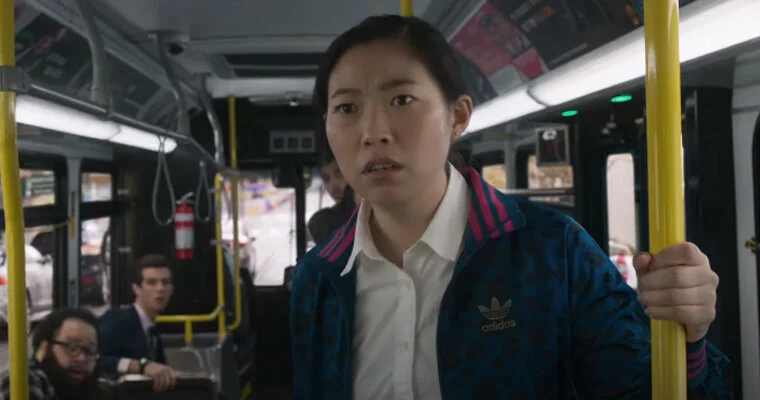‘Shang-Chi and the Legend of the Ten Rings’ Review: A Creative New Addition to the MCU
After 24 previous Marvel films, the conclusion of the infinity saga and dealys in production, how will ‘Shang-Chi’ fare compared to its predecessors?
“Shang-Chi” follows our titular protagonist (played by Chinese-Canadian actor Simu Liu) having to face the former life that he thought he left behind as the ultimate human weapon after being drawn back into the secretive international criminal organization The Ten Rings led by his own father (played by Hong Kong cinema legend Tony Leung).
As the first Asian-led superhero film produced and released in American markets, “Shang-Chi and the Legend of the Ten Rings” features an ensemble Asian starring cast, including the aforementioned Simu Liu and Tony Leung, along with Awkwafina, Fala Chen, Michelle Yeoh, Meng’er Zhang, Ronny Chieng and more.
The film comes to us from director Destin Daniel Cretton, notable director of such films as “The Glass Castle” and “Just Mercy,” and from a script penned by Cretton, David Callaham (recent screenwriter of “Wonder Woman 1984” and “Mortal Kombat”) and Andrew Lanham.
The film has some of the best hand-to-hand fight choreography and fight scenes in the entire MCU. Not since “Captain America: The Winter Soldier” have close-combat fight scenes been so expertly choreographed and executed. Interspersed throughout the runtime, we get multiple chances to see Simu Liu fully grow into his role as a superhero and show why the character of Shang-Chi is the deadliest martial arts fighter in the MCU.
Cretton has revealed much of the inspiration for the fights in the movie come from iconic Hong Kong martial arts films, especially Jackie Chan movies, as well as incorporating aspects from other cornerstones of Chinese cinema like “Crouching Tiger, Hidden Dragon.” All of these serve as excellent influences on the film to make the action exciting, thrilling, and an absolute spectacle to watch onscreen, especially in the bus scene in the first act that was featured prominently in the trailers.
Coming into play with this are the multiple fighting styles we see throughout the film, whether it be the forceful and striking styles of Shang-Chi and his father Wenwu, or the more elegant and flowing martial arts moves of Michelle Yeoh’s Jiang Nan.
Aside from the action, the character of Shang-Chi himself is an interesting protagonist that serves as a vessel for the delivery of some hard-hitting core themes of the film. Present throughout the story are ideas about destiny and identity, and more specifically how we figure out who we are as individuals on our own path versus the paths that are seemingly chosen for us either by our parents, our lineage, or our own past.
Shang-Chi finds himself roped back into the life as a trained killer that he thought he had left behind over a decade ago, after finally thinking he had created his own new identity that was actually him. But with the reintroduction of his father into his life in the first half of the film, he begins an emotional journey to dig deep down within himself to discover who he truly is and what he truly was meant to be.
Along the way, he finds that even though those who come before us and those things which we have done in the past can help shape who we are in the present, ultimately redemption is possible, and we can find our own third way to actualizing our identity. That theme about self-discovery in the wake of trauma and emotional baggage is very powerful and detailed very well throughout the film and Shang-Chi’s character.
Simu Liu’s performance as Shang-Chi brings a lot of likeability to the character, and Liu really makes you root for him from the very beginning when he draws the audience in with his charming and charismatic nature. As someone trying to live a normal life, Shang-Chi presents one of the most relatable characters for mainstream audiences to have in their daily lives.
Liu also shares the screen in this film from an immensely talented collection of actors who all deliver praiseworthy performances as standout side characters in the MCU. Awkwafina’s Katy has a lot of Awkwafina’s humor and extraverted personality that works well when bouncing off of other characters, especially Shang-Chi.
One thing to appreciate is the relationship Katy and Shang-Chi have, which is some of the best onscreen chemistry in the MCU. While a conventional relationship storyline would have led to a swelling of emotion and a dramatic kiss, theirs is played a lot more subtly and smartly that gives us just enough hints that something more electric is there than friendship but without pouring over into cliches.
One cannot talk about great characters in this movie without referencing Tony Leung’s Wenwu, also known as The Mandarin. Leung’s portrayal is arguably one of the most intimidating villains in the MCU, who has such a gravity in his presence that makes you tense up and on edge whenever he is onscreen. His character lives off of reputation and legend, and we see his dark and cruel nature throughout the film, and Leung truly makes for a fearful antagonist with an even more fearful weapon at his disposal: the Ten Rings.
On top of this, his character has motives we can all relate to as he only quests to save the love of his life that convinced him he was not who he thought he was, and without her his only option is to be that person, which is The Mandarin. This all serves to make him a very emotionally compelling antagonist supplemented by Leung’s A-list performance.
Shang-Chi also serves as a creative and much-needed expansion to the Marvel Cinematic Universe, bringing a relatively-obscure comic character to life on the big screen. The film offers a wide variety of new worlds, powers, abilities, and characters all of which serve to make the MCU more and more interesting and unique moving forward. In particular, the mid-credits scene features a cameo appearance from two well-known Avengers that promises an exciting future for Shang-Chi, not only in sequel solo movies, but for the bigger universe as a whole.
However, the movie is not without its own fair share of faults. One of the biggest detriments to this film was the apparent need to fit the movie into the “Marvel template” that we have all come to recognize and, in more recent cases, grown tired of. The movie never ceases to intermix unnecessary humor into serious or tense scenes. The film could have been a lot better had it been able to do its own thing rather than insert misplaced jokes into dramatic moments throughout. The movie also suffers from an over-processed digital CGI look for nearly every background shot and setting that feels like a very artificial and formulaic cinematography.
Audiences will most likely also be torn on the film’s main antagonist; The Mandarin. While the character and performance is indeed intimidating and threatening and cold as all hell, we predominantly only hear about all the villainous things he has done, either through narration or dialogue exposition, rather than see them. That exposition heavy backstory creates no connection or menace to the villain, when Marvel has been known to do significantly better by their baddies.
His character is presented as a figure of legend and we do not get to see all that much of him in the runtime actually doing villainous things (other than the occasional flashback), he serves more as a looming threat rather than a more immediate one. Not to mention, through revelation in the climax of the film that he was being misled by an ancient spiritual force the entire time sort of cheapens his villainous character a bit and softens his role as what should have been an ultimate criminal mastermind.
The film is also very exposition-heavy, relying primarily on flashbacks with overarching narration, or characters explaining necessary information to each other mostly to communicate directly to catch up the audience. One thing that is not expounded upon, however, is the actual nature of the Ten Rings and the Mandarin’s full history, which feels left out and neglected whereas that could present some of the more relevant and more interesting subject matter to learn about for this film. In combination with the mid- and post-credits scenes, it seems these are left largely to keep interest high for the sequels. Without properly describing the Ten Rings, they almost become a ‘MacGuffin’ that have no defined rules and serve the plot however necessary.
Along with the exposition, the pacing of the film feels like it could have been reworked in the script. The film starts off incredibly slow and takes a good while to actually get going, whereas there is a good thirty-minute chunk towards the middle of the film where the action takes off and the story moves at a very good pace, only to totally slow down again once the characters reach The Mandarin’s palace in China. The story then slowly chugs along from there on out, and definitely drags out its own runtime, all leading up to a final battle that was rather disappointing and underwhelming especially compared to the amazing nature of the previous fight scenes.
The main problem with the final battle was that fists and martial arts were replaced with magic weapons and massive CGI dragons in a battle that did not seem to fit the Shang-Chi character that had been established in the story beforehand. This felt like yet another consequence of the Marvel template, as Shang-Chi was not a character who by nature lends himself to a massive world-ending CGI monster fight. It would have been much preferable had the fight been smaller-scale and focused on an intense hand-to-hand fight between father and son over the Ten Rings.
“Shang-Chi and the Legend of the Ten Rings” is a creative and exciting new addition to the Marvel Cinematic Universe that brings a new relatable and interesting main character to the table along with some of the best action and most powerful themes we have seen so far. However, it ultimately falls short in delivering a fully-actualized villain, a film free from the ‘Marvel effect’, and proper pacing with an appropriate climax in its script.




